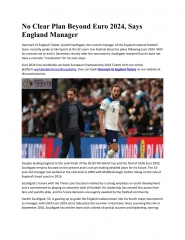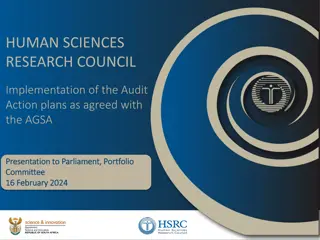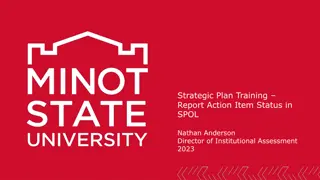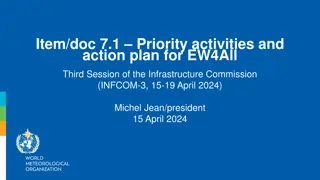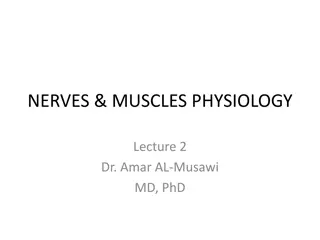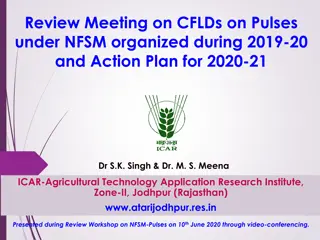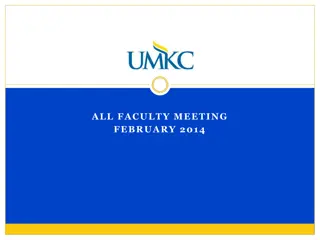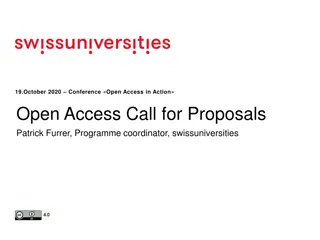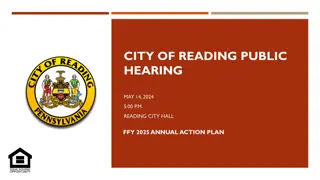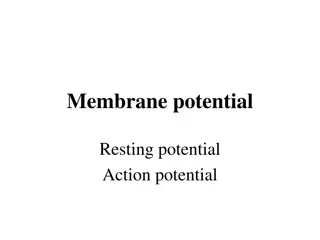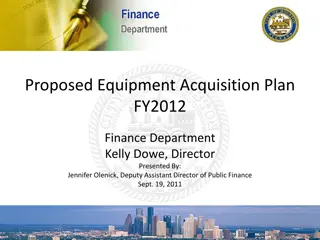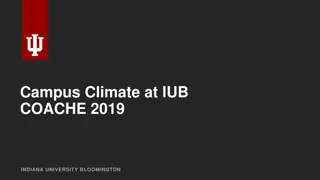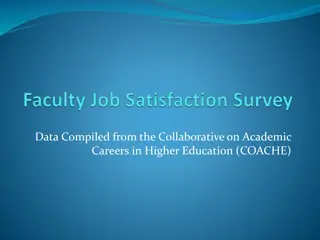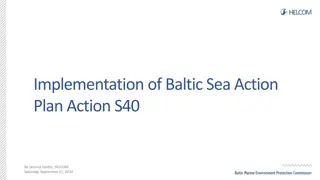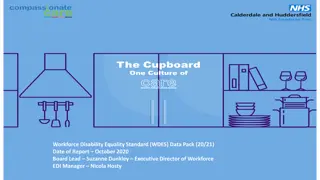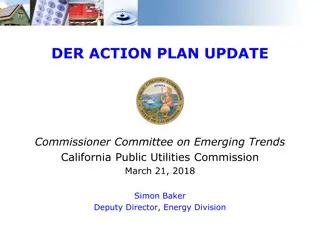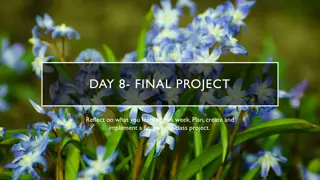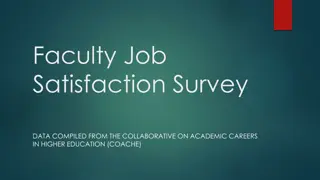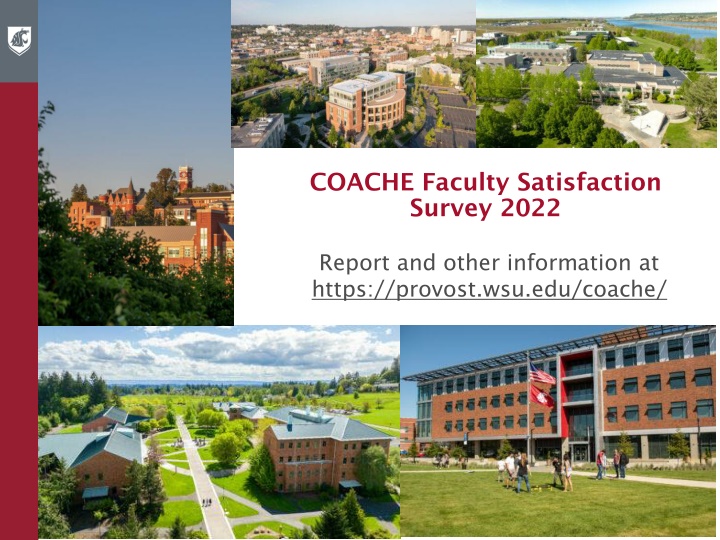
Faculty Satisfaction Survey 2022 Report and Action Plan at WSU
Explore the results of the COACHE Faculty Satisfaction Survey 2022 at WSU, focusing on strengths, weaknesses, and the action plan moving forward. Key areas include survey domains, feedback gathering process, criteria for selecting actions, and the detailed action plan timeline to enhance faculty recognition and inclusivity. Stay updated with the latest initiatives to improve faculty experiences at WSU.
Download Presentation

Please find below an Image/Link to download the presentation.
The content on the website is provided AS IS for your information and personal use only. It may not be sold, licensed, or shared on other websites without obtaining consent from the author. If you encounter any issues during the download, it is possible that the publisher has removed the file from their server.
You are allowed to download the files provided on this website for personal or commercial use, subject to the condition that they are used lawfully. All files are the property of their respective owners.
The content on the website is provided AS IS for your information and personal use only. It may not be sold, licensed, or shared on other websites without obtaining consent from the author.
E N D
Presentation Transcript
COACHE Faculty Satisfaction Survey 2022 Report and other information at https://provost.wsu.edu/coache/
COACHE Faculty Satisfaction Surveys Harvard Collaborative on Academic Careers in Higher Education Annual survey on faculty satisfaction WSU participated in 2008, 2014, 2022 Delivered to 82 universities 2022 WSU faculty participation rate = 48%
COACHE Survey Domains Nature of Work (in service, research, teaching) Resources and Support Cross-Silo Work and Mentoring Tenure and Promotion Appreciation and recognition Institutional Leadership Shared Governance Departmental Engagement/Quality/Collegiality
Strengths Departmental leadership and collegiality Weaknesses Compensation Equity, inclusion, belonging Tenure Mentoring Faculty recognition and appreciation Mentoring (CT) Nature of workload Promotion and tenure clarity Shared governance
Gathering feedback After aggregate data received: Feedback/scoping from domain subcommittees Published preliminary findings (Sep. 2023) Socialized findings and collected feedback using town halls, meetings with other groups Feedback was evaluated to identify actionable steps Report approved by Provost Chilton (Jan. 2024)
Criteria for selecting actions Preference for activities that: Address more than one domain weakness Can be executed in a timely manner Benefits expected to accrue to all faculty Feasible given resources available Who are the actors?
Action plan https://provost.wsu.edu/coache/ Faculty Recognition Initiative Phase I (Spring-Fall, 2024) Develop an inventory of faculty activities across the WSU system Re-examine annual review process for inclusivity of faculty effort; re-examine the role of Activity Insight Phase II (Spring-Fall, 2025) Revise annual review guidelines and implement spring 2026 Develop process for regular review of P&T guidelines across system
Other planned activities Requiring a review of faculty activities in the fourth year post-associate to ensure that faculty are well-positioned to seek promotion to professor within the upcoming 1-3 years. Develop resources for faculty to describe impact of their work, particularly in the context of community-engaged scholarship. Develop a workshop or other resource on how to write impactful nomination letters for faculty honorifics. Commit to specific proposals to advance the research enterprise at WSU by the end of July 2024.
Other potential activities Offer a career-track professional leave. Offer ongoing financial incentives and support for faculty to engage with high performance learning methods such as student service learning. Work with Faculty Senate and HRS to conduct a system-wide review of practices and policies on staff hiring to identify concerns and propose solutions. Develop a philanthropically funded scholarship program to allow WSU employees to enroll in WSU Global courses. Appoint a system-level position for DEI leadership.
COACHE 2024 Launches in early February expect to see a formal invitation for participation from Provost Chilton You will receive a survey link directly from COACHE All faculty with >=0.5 FTE are invited. We will have campus- and college-level results. Unlike 2022, we will have access to individual record data, which allows us to analyze cross-sectionality of variables. With 2022 data, Q: Clarity of whether I will be promoted? 37.4% overall Women = 39.4%, Faculty of color = 36.8% Women who are faculty of color = ??
Important qualifiers Faculty with associate dean or higher appointments are excluded. Questions about faculty leadership = Faculty Senate Provost Office will NOT have access to record-level data, which is crucial to protect anonymity. Data will be fire-walled and analyzed at Institutional Research. This work is governed by an IRB/human subjects protocol. All Faculty response label count % Clarity of expectations: Patient care/client services Q137G Very clear N<5 N<5 Somewhat clear N<5 N<5 Neither clear nor unclear N<5 N<5 Somewhat unclear N<5 N<5 Very unclear N<5 N<5 Decline to answer N<5 N<5 Not applicable N<5 N<5
Once COACHE 2024 is announced, Please encourage your colleagues to participate Data => Discussion & scoping of activities => action This only works well if the data is representative of the faculty population.
Questions The COACHE Survey website states that the survey was "partially funded with state funds provided to support a state-mandated faculty climate survey". What was the source or sources of funding other than state funds? What state entity mandated this survey, and did this state entity receive a full report including the quantitative and qualitative data? When will the qualitative comments from the COACHE survey be released on the website constructed for dissemination of data and results?
Washington State SB 5227, 07/21 Concerning diversity, equity, inclusion, and antiracism training and assessments at institutions of higher education Provides for establishment of a professional development program on DEI, and antiracism for faculty and staff Must conduct a campus climate assessment to understand the current state of DEI in the learning, working, and living environments on campus for students, faculty, and staff. The campus climate assessment must be conducted, at minimum, every five years. By December 31, 2024, and biennially thereafter submit a report on the professional development programs and campus climate assessments and annual listening and feedback sessions.
2022 COACHE Committee Laura Hill, Doug Call, Katie Cooper co-leads Ekaterina Burduli Kira Carbonneau Pat Carter Kim Christen Chris Dickey Glen Duncan Obie Ford III Fran Hermanson Christine Horne Masha Gartstein Phil Gruen Lisa Guerrero Stephanie Kane Coleen McCracken Clemma Muller Oladunni Oluwoye Kristina Peterson- Wilson Bruce Pinkleton Anna Plemons Paul Skilton Clif Stratton Jenny Thigpen


